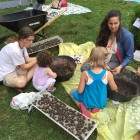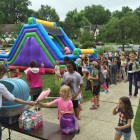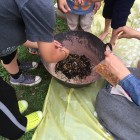Clinton School kicked off the summer with a celebration of pollinators at our annual end-of-year picnic June 18.
We decided to honor pollinators—bees, hummingbirds, butterflies, bats, and more—because June 15 to 21 was National Pollinators Week.
Today, it’s more important than ever to know why pollinators are important and how we can protect them. The Nature Conservancy has a great list of just five simple things you can do in your yard to support pollinators.
So what do pollinators do? They help plants make fruit or seeds by spreading pollen from one part of the plant to another. This fertilizes the plant, so it can reproduce.
Pollinators help farmers grow nearly $200 billion worth of honey, fruit, vegetables and other products every year, but the US is losing 3,000 acres a day of pollinator-supporting farm and ranch land. Some chemicals used to control weeds can also harm pollinators.
Luckily, people are working hard to help save the pollinators. President Obama announced June 1 that the federal government will make a “flyway” of flowers along the highway from Texas to Minnesota to assist the monarch butterflies in their epic migration from Mexico to Canada. The federal government will plant land it owns along the highway with milkweed and other plants to feed the butterflies and their very hungry caterpillars.
Clinton’s event featured a caterpillar-shaped bouncy house, arts and crafts, seedball making, and more. Seed balls are plant seeds packed into a ball of mud and clay that can be tossed into vacant lots and any other place that could benefit from some flowering plants to help sustain our hardworking pollinators!
Anne Harding is Clinton School’s garden coordinator, and a big fan of pollinators, especially bats.




